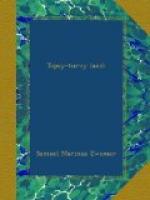Another interesting fact to notice is that part of the inscription on the coin is English. Coming events cast their shadows before. England’s power in checking the cruel slave trade and rooting out piracy on the coasts of Arabia has made its influence felt. An English primer is sure to follow a penny with an English motto, and some day our mission will have a school at Muscat for Arab boys and girls, as well as for rescued slaves. Your American pennies and your prayers will help to bring it about. Moreover, do you not think that if they keep on buying gospels and reading them, Jesus Christ will some time be the true Imam of Muscat and Oman?
[Illustration: HASSA COINS.]
The other coin is the only old coin that is at present current in Arabia, and I leave you to decide whether it is not the oddest and queerest penny you have ever seen. The first time I saw these queer blacksmith-nail coins was in 1893, when I made a visit to Hofhoof, the capital of the province of Hassa, in Eastern Arabia. The people used them, as we do pennies, for all small purchases, but I fear such a pointed coin must have been harder on their pockets than our round coins. It is called the Taweelah, or long-bit, and consists of a small copper-bar of about an inch in length, split at one end and with the fissure slightly opened. The coin has neither date nor motto, although one can yet occasionally find silver coins of like shape with the Arabic motto: "Honour to the sober man, dishonour to the ambitious." The coin, although it has no date, was undoubtedly made by one of the Carmathian rulers about the year 920 A.D. This was more than five hundred years before Columbus discovered America! The Carmathians were a very fanatical sect of Moslems. You remember reading in chapter three how they took the black stone from Mecca?
Well, these people had this province as the centre of their power and here they struck these peculiar coins. I have heard it said that they were so opposed to images and faces on money that their leader devised this long bar-like shape for his coins to prevent any one from making images on them!
At any rate the Carmathians were very brave warriors. When Abu Tahir, their first leader, attacked Bagdad with only 500 horsemen he was met by a messenger from the city saying that 30,000 soldiers were guarding the gates. “Yes,” said Abu Tahir, “but among them all there are not three such as these.” At the same instant he turned to three of his companions commanding one to plunge a dagger into his own breast, another to leap into the rushing Tigris river and the third to cast himself down a precipice. They obeyed without a murmur. “Relate,” continued the general, “what you have just seen; before evening your leader shall be chained among my dogs.” No wonder that with such absolute obedience, the Carmathians terrified all Arabia with their army.
As I handle their old coins and think of the past, I sometimes wonder how much Our Great Captain, Christ Jesus would accomplish had He soldiers equally obedient and brave as did the Carmathian general, in redeeming Arabia from its long darkness and bloodshed. It is nineteen hundred years ago that He commanded us: “Go ye into all the world and preach the gospel.”




